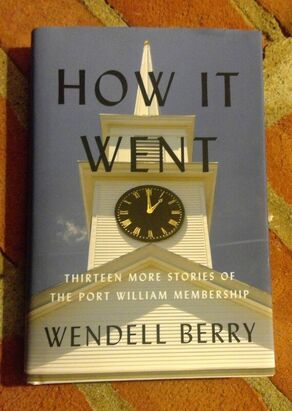 Driving down the road. Putting wet laundry in the dryer. Picking up a garden trowel. The quiet moment before falling asleep. A memory slips into your mind—their familiar whistle, particular look or smell, a phrase spoken…you remember and for a moment you re-member. The Port William Membership…if you don’t know what I’m referring to, it’s time to be introduced to Wendell Berry’s fictional town in Kentucky, its landscape and people. How It Went: Thirteen More Stories of the Port William Membership is his latest (and hopefully not last) book. I bought it for myself for Christmas and quickly read it, but like each of his Port William novels and short stories, they stay with me long after. Berry has a knack for describing the lived experience of the land and its people. Even if their particularities are not your particularities, you find yourself woven into their human experience. Stories of small town & farm-life, a barber and his shop, being a child or a parent during a world at war in the 1940s…they pull you in and draw you like a threaded needle into the fabric of your own life. With an ease that may surprise, you open your own memory box containing the people and places that have made you and many times, held you together. This particular book centers on an old man, a writer, looking back (like Berry himself). “Memories of times and places he had forgotten came back to him, reached him at last as if they had been on their way for a long time. He realized how fully and permanently mere glances, touches, passing words, from all his life far back into childhood, had taken place in his heart…” (p. 76). Andy Catlett remembers those no longer living and “yet by their absence his old companions have in a way come closer to him than they were when they were alive. They seem to involve themselves intimately in his life as he goes on living it” (p. 131). He sounds a lot like Saint John Chrysostom in the 4th century: “Those whom we love and lose are no longer where they were before. They are now wherever we are.” There are expressions of wit and wisdom that you have inherited. There are people whose presence, whether still with you in body or not, continue to bring comfort, encouragement, or perhaps curiosity! Pause for a moment:
___________________________ Just now as I finished writing, my son opened a can of sparkling water and the sound of his pouring it over ice took me back to childhood. I’m in 4th grade, pouring a cold glass bottle of Pepsi over ice and running it out to my mom who is push-mowing the front yard. I knew she loved the frothy fizz and wanted her to enjoy it that hot day. Although little fizz was left by the time she stopped and knelt down to drink it, I remember her look of appreciation, her joy in being remembered. To Get Started with Port William, look for these books: Jayber Crow Andy Catlett: Early Travels Hannah Coulter Nathan Coulter A Place in Time: Twenty Stories of the Port William Membership How It Went: Thirteen More Stories of the Port William Membership Kasey Hitt is a co-founder and instructor for Wisdom Tree Collective. She’s been a spiritual director since 2003 and has been reading Wendell Berry novels and poetry for just as long.
You can also find this blog and others from the Membership of Wisdom Tree Collective here. For some of us, Christmas is not experienced as "The Most Wonderful Time of the Year." For all who find themselves in this place, my husband, Russ, and I have offered The Longest Night of the Year Service on or around the Winter Solstice. A friend suggested it to us and after the first gathering in a small, country church over a decade ago, we knew it was something we wanted to continue. The service offers a safe space to acknowledge mixed feelings surrounding the holidays, to join together in lament and longing, and to simply step away from the rush of the season and breathe. Usually Russ offers only instrumental music during the short, 30 minute service but last year we offered the service via Zoom and he created a video with his only song with lyrics, "Some of Us," on his album, The Longest Night. Click on it below, listen and watch. Perhaps there's an image or lyric that connects with your own lament and longing, something that speaks to your soul. As to this year, we are offering the service online once again knowing more people can participate this way. I invite you to join me and a handful of others from Wisdom Tree Collective and Friday Morning Centering Prayer as we allow instrumental music, art from local/regional artists, laments and longings from Scripture, and Creation's own rhythm to companion us in the dark. Tuesday, December 21st 7:30-8:00pm CT Email me for the Zoom link.  It had not even been 24 hours since she got the news her cancer was back. Whenever I have a cancellation, I contact those who are on my waiting list to see if anyone wants the spot. In October, a person I had not seen for a long while got in touch with me saying she just had a feeling she needed to begin spiritual direction again. I had no openings but promised I would contact her when one became available. A couple of weeks later, I happened to have a cancellation and she was able to arrange her schedule to meet with me later in the week. She had no idea when we set that appointment that she would be sharing news about the return of cancer. Last week I wrote about friends who have terminal illnesses and wake up happy and grateful. But when the news is fresh, that’s probably not how you’re going to wake up. Scared and angry is more like it. During our session of Reiki and guided prayer, I asked her if she could let God be angry with her about the news she had just received. “God doesn’t get angry,” she said. “Well then you haven’t read the prophets,” I replied. “Really…” she said with a mix of surprise and sarcasm. “Yes, really, I imagine God damning this prognosis to hell. I want to yell: God, damn it!” She smiled wryly. And then her imagination began to unfold and tears mixed with words flowed, as she let God into her anger. Sometimes we wake up happy and grateful. Sometimes we wake up scared and angry. God can join us in both. Both can be holy as we allow God into every part of our lives. Even though we may know God is always present, we often live as though God is far off and we are on our own. Or we might think that God expects us to be hopeful and happy so will wait until we have a bit more gratitude before joining us. This simply is not true. The Creator who endowed us with the full-range of human emotions, expects us to express them. And every single one of them can be pathways to prayer and to the very heart of the One who made us. Rather than running and hiding through self-sufficiency, self-loathing, or a smile, when the Divine Presence asks, “Where are you?” let’s be honest. “Here I am!” we can say and then name where and how we really are—angry, sad, scared... Let God in, for God knows it’s not good for any of us to be alone. Or maybe both.
Whatever length, from 90 minutes to 4 days, I always offer these words at the beginning of a silent retreat: "Some of you have come here to rest, some to wrestle. You will probably end up doing both and both are holy." Many people think the purpose of a retreat, especially a silent one, is to rest. And that's true...but sometimes what brings rest doesn't feel like it at first. The pace of life can leave little time to slow down or stop for a while. A silent retreat offers one an opportunity to do just that...there's nothing one has to do. There is no food to prepare, no lawn or children to take care of, no work-related tasks that need to be done...ah freedom! Slow walks, naps, sitting by a pond, taking time while eating, these can be a welcome change of pace. But the pace of life can also leave little time to tend to feelings of grief and anger. A silent retreat offers on an opportunity to do just that...there's plenty of space in your schedule to welcome what has not had time (or permission) to surface. For those who have been in survival-mode from one day to the next, whatever the cause, a cleansing cry may bring the kind of rest most needed. A prayer walk or talking to a spiritual director about one's anger rather than continuing to hold it in may bring the freedom most desired. And where better to wrestle than a safe, quiet, and beautiful place of prayer?! One retreatant pointed out how the word "rest" is found within the word "wrestle." Fascinating. We do not need to fear wrestling, for within it we find rest! Is it time for you to come away to a quiet place by yourself to rest and wrestle? I've got an opportunity for you! A couple of rooms have become available for October 28-31, at Saint Meinrad Archabbey in St. Meinrad, IN. Scholarships are available. Register here. "Make Me an Instrument of Your Peace" is this silent retreat's theme. And peace may just begin with some wrestling! A couple of weeks ago, I walked into the bedroom, closed the door, and collapsed on the floor in tears.
I was done in that moment. My inner storm clouds were too heavy and calling for release. There's a lot going on in our world, isn't there? For many, there is a lot going on in their personal world as well. Adding virtual school to my mix and constantly hearing, "Mom!" so many times that I've begun to hear it even when no one's calling, was my breaking point. Conversations with others who are feeling the weight of the world and going through their own personal crises have revealed a "grin and bear it" attitude. Trying hard to ignore the tension and anxiety they continue on even as they feel the inner storm clouds growing more and more each day. One thing I've learned from my indoor cat is that if she doesn't get her playtime in, she doesn't get her anxiety out which leads to other issues (i.e. not using the litterbox). She's got to release the tension of the day through leaping, running, and chasing. Following her lead, I've tried to be mindful about moving anxiety out of my body, too—shaking, squeezing, twisting—through at-home Zumba, barre workouts, and yoga. This release is helpful but one thing is missing...cleansing. Crying is physically, emotionally, mentally, and spiritually cleansing. It needs to be added to our personal self-care practices. It already is an ancient spiritual practice for individuals and communities called lament (though you may hear of few congregations who practice it). It's as natural for us to cry as clouds to rain. So why do we often "hold it in"? When I offer Distance Reiki, in the majority of my sessions, I have tears come to my eyes at some point. As parts of a client's body release, I feel a rush of energy in my own body, causing the common "lump in my throat" followed by tears. What was released inside is ready to be released outside. Upon mentioning it to the client afterwards, they always shake their head, "yes." For they either began to cry during the session or felt the lump in the throat, knowing they need to give themselves permission for a good cleansing cry sooner than later. I once had a client that wept and shook mightily during an in-person Reiki session (with eyes remaining closed but tears streaming). Afterwards they had no idea they were shaking so much but said they weren't surprised, for they came desiring long-held trauma to leave their body and it had. So is it time for a good cleansing cry for you? Or will you continue to hold it in and put it off? Imagine clouds getting heavier and heavier and refusing to let go and rain...can you feel those clouds in your body? After a rainstorm, everything feels lighter. That's what happened for me. An hour after light crying with intermittent gut-level sobbing, my head was clear, my body relaxed, I felt at peace. I opened the door, now ready to walk out and tend to whoever called, "Mom!" first. What do the Coronavirus and the Reign of Love Have in Common?: A Facebook Post from June 27th7/7/2020
Facebook's "what's on your mind?" prompt has been taunting me, so here's what's on my mind. It begins with a conversation...
“You know what’s strange? Most people I see who aren’t wearing masks are Christians,” a friend who was standing over 6 feet away said to me. We both shook our heads. Interconnected. That’s what we are with everyone & everything. In not recognizing it, we are what the prophets lamented, “foolish and senseless people who have eyes but do not see, ears but do not hear.” Which leads to little understanding of how God is present and at work in our world. After all, one way Jesus described the Kingdom of God is “like yeast that a woman took and mixed into about sixty pounds of flour until it worked all through the dough" (he also used the image of yeast to describe leaders’ hypocrisy). The Reign of Love, like coronavirus, spreads in hidden ways. We had Thanksgiving dinner at my brother-in-law’s parents’ home this past year. They live less than 5 miles away. Both were diagnosed with COVID-19. His dad died this week. My husband’s grandma was diagnosed with COVID-19 this week, too. And we await the test results of a dear friend as to whether or not he has COVID-19. The politicization of COVID-19 and seeing people not taking it seriously infuriates me. I can’t help but think of words found in Deuteronomy 30, “I have set before you life and death, blessings and curses. Choose life that you and your descendants may live.” The “you” being addressed is an entire nation of people. A nation is made of many individual “yous.” So the choice is both personal and communal, they’re interconnected. And they also impact not only those we see right here, right now, but generations to come (we’re seeing this truth with our nation’s racial injustice crying out to be healed). Granted, the choice doesn’t always look or feel like life at the time. The path of/toward Life often does not. In the middle of May, we decided that until the virus’ spread trended downward for 2 weeks or we could assure social-distancing measures, we needed to do our best (knowing we wouldn’t do it perfectly) to “love our neighbor as ourselves.” So we cancelled our vacation and we have not let Alex play on his travel baseball team (the latter decision harder than the former). Does it make any difference? We don’t know. But those are a couple of ways our family has and continues to choose Life. Given our awareness of our interconnectivity to everything and everyone else, including all of you, we can do no less. My 13-year-old daughter started animating the morning after a tornado blew through our town of Mount Juliet, TN, leaving a path of heart-breaking destruction. At first, it was a way for her to express her feelings. It then became a way for her to speak to others affected by the storm and direct people to give to The Community Foundation of Middle Tennessee. When she first showed me her completed animation, I was amazed by its heart and simplicity.
One scene in particular continues to stay with me. When the boy grabs hold of the extended hand, he bursts into tears. Rather than stifle them, the touch allows his tears to flow freely and the animation stops right there. It doesn’t end on a sunny note (even though she wrote earlier in the video, “It’s going to be okay…We’re in this together.”). Having the promise of things inevitably being okay does not mean we are (or someone else is) okay in the moment. It does not mean we need to stop our tears or think there’s nothing to cry about (even if someone does have it worse). There is a time to leap into action, to encourage each other that all will be okay, to gather in churches to sing praises and offer thanksgiving, to share Scriptures and words of hope to find strength for the road ahead. There is also a time, especially as the shock wears off, to allow for tears, both individually and communally, and stop right there. 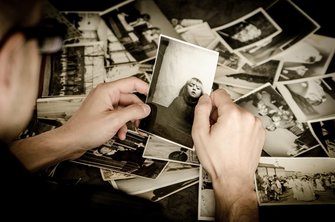 Ever find yourself angry when someone did not do what they were "supposed" to do or be who they were "supposed" to be? Whether it's a relationship with one person, your whole family or even your church family, there's bound to come trouble and disappointment. I was recently asked how I had discovered peace given my own disappointments and struggles. I was encouraged because this meant the person sensed peace in me where they had not before! The truth is, peace began to fill me when I started practicing letting go of the way I had pictured things. When I loosened my grip on demanding things and people to be how I wanted them to be, I was in for a surprise! Guess what happened? Scales fell from my eyes and I began to see how God was providing for me in ways I simply could not see when I was demanding how, when, and who. When I shifted from feeling angry and filled with bitter disappointment when "how, when and who" did not come through it was like the moment in Genesis 28:16 when Jacob exclaims, "“You were here all the time, and I never knew it!" We all have idealistic pictures as to how our life and relationships should look. This comes as no surprise, our culture schools us in desire and what it should look like so we pursue and learn to create illusion. This is especially true during holidays or important life events and stages. We have expectations. We long for the perfect experience or outcome. Actually, the core desire in the idealism is usually good. At the core I find the longing to give and receive love in all its forms from belonging to delighting. It's what we do with the desire as to whether or not it leads to life (and peace). As I observe my own life and the lives of others, here are some places we can go with desire so it remains life-giving: We can lament. The process of letting go of what we desired and pictured is difficult. God knows this, it's one reason why there are laments in the Psalms. In a perfect world, our relationships and society would not be so filled with wounded people wounding people (including ourselves). When we do not have the deep relationship we wish we had with a person or the co-workers we pictured, the church we desired or the family gatherings we had hoped for, we can allow ourselves to name, express and feel the loss. We can let go. From small, daily letting go to larger, deeper letting go, the smaller ones prepare us for the larger. For example, take Psalm 27:10, "Even if my father and mother abandon me, the Lord will hold me close." Who exclaims such a thing? Someone who has experienced God's steadfast love in the small betrayals and so trusts God in the big ones. This person recognizes that when others cannot provide, God can. Can you relate to others being unwilling or unable to come through? Just like the Psalmist, we can begin to release our stranglehold, our white-knuckled clutch, on whoever or whatever is not giving us what we want, need or pictured. We can transfer the people, situations and ourselves into the hands of God. We can be on the lookout. Perhaps one reason the text in Luke 17:21 can be translated either the Kingdom is "within or among you" is because both are true! When I let go of demanding a particular person or group meet my need then I am freed up to see how God is providing everything I need. It could arise within me or come through other people or parts of the created world I did not expect. Recognizing the ways the Spirit of Love is speaking from within ourselves takes practice. Yet sometimes when life is particularly overwhelming, no matter how strong our spiritual life, we are unable to access the Kingdom of God within us. This is when the Body of Christ (when functioning as intended) can step in and offer the steadfast, creative love of God. May we allow lament and letting go of the way we pictured things to clear our eyes and create space that we may see and receive the Kingdom of God.
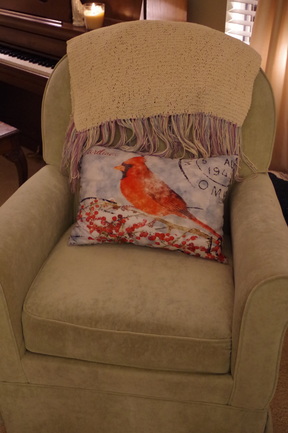 "It's going to be a long Advent," my friend said. She's experiencing and anticipating a long period of darkness. I, too, lament as I listen to the losses of those I sit with in spiritual direction or read news and see images of tragedy and anxiety around the world. Advent's holy invitation is to get in touch with our longing for the Light to come--for hope, peace, joy and love to return to our lives and to our world. Even when the night grows long and deepens, we wait. So how do we survive the dark? Mira, an early 16th century poet in India who knew suffering and helped others who suffered, wrote the following lines: I know a cure for sadness: Let your hands touch something that makes your eyes smile. I bet there are a hundred objects close by that can do that. My eyes smile when I think of my daughter's hand in mine, the coziness of a certain blanket, the fluffiness of the neighbors' cat who comes over for a daily visit, the smoothness of a stone with the word "TRUST" carved into it...but what do my eyes fall on in this moment? For THIS moment is where God comes to meet me. It's my mint green velour rocking chair. An ordinary object found right where I am. THIS is where God finds me, right where I am. And there's beauty there, MIra reminds me. So without a book or something to accomplish, my eyes smile as I sit down in this chair that tenderly holds me in the dark.
May you touch something that makes your eyes smile and in doing so be reminded that God is near...no matter how dark. |
AuthorKasey is a scarf, ball and club juggling spiritual director just outside of Nashville, TN. Play helps her Type-A, Enneagram 1 personality relax, creating space for poetry and other words to emerge. She also likes playing with theological ideas like perichoresis, and all the ways we're invited into this Triune dance. Archives
January 2024
Categories
All
|
By clicking “Sign up for E-News” I consent to the collection and secure storage of this data as described in the Privacy Policy. The information provided on this form will be used to provide me with updates and marketing. I understand that I may modify or delete my data at any time.
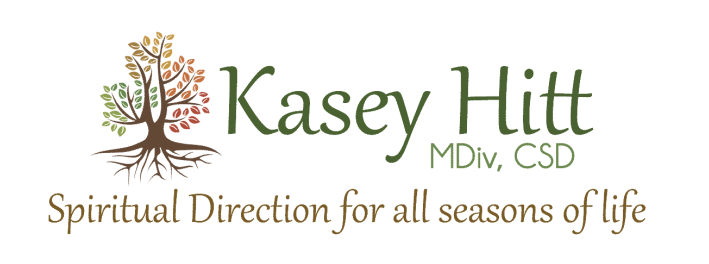
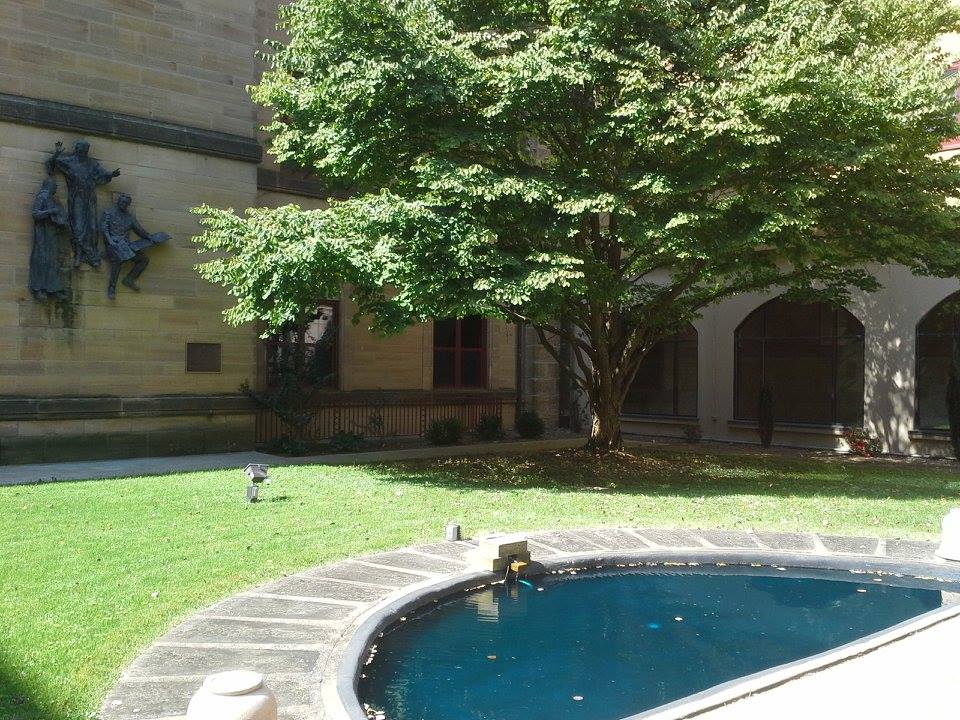
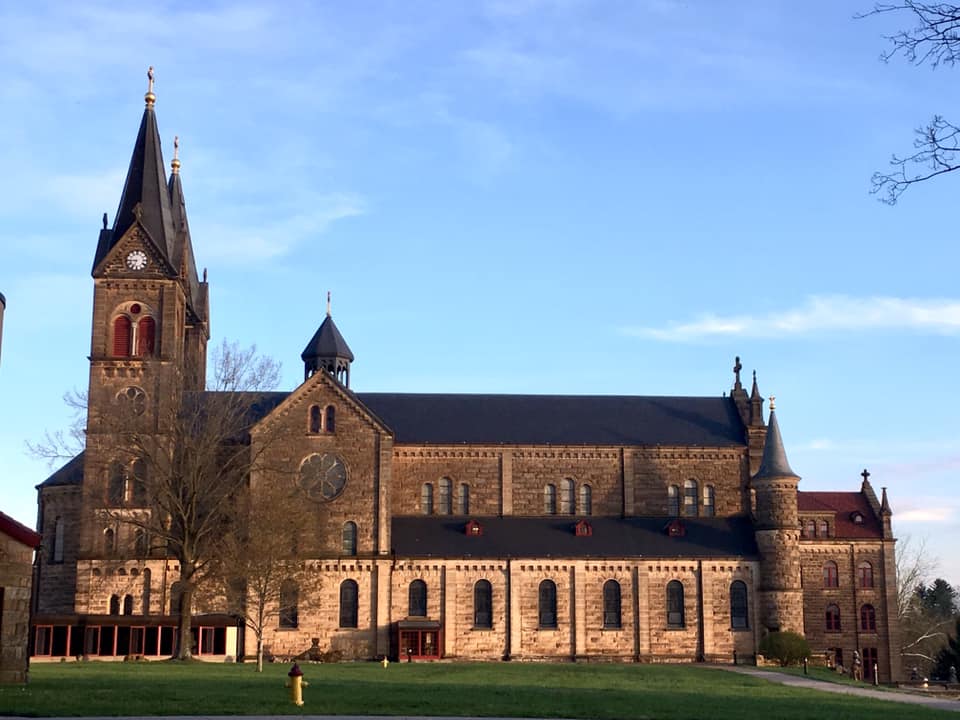
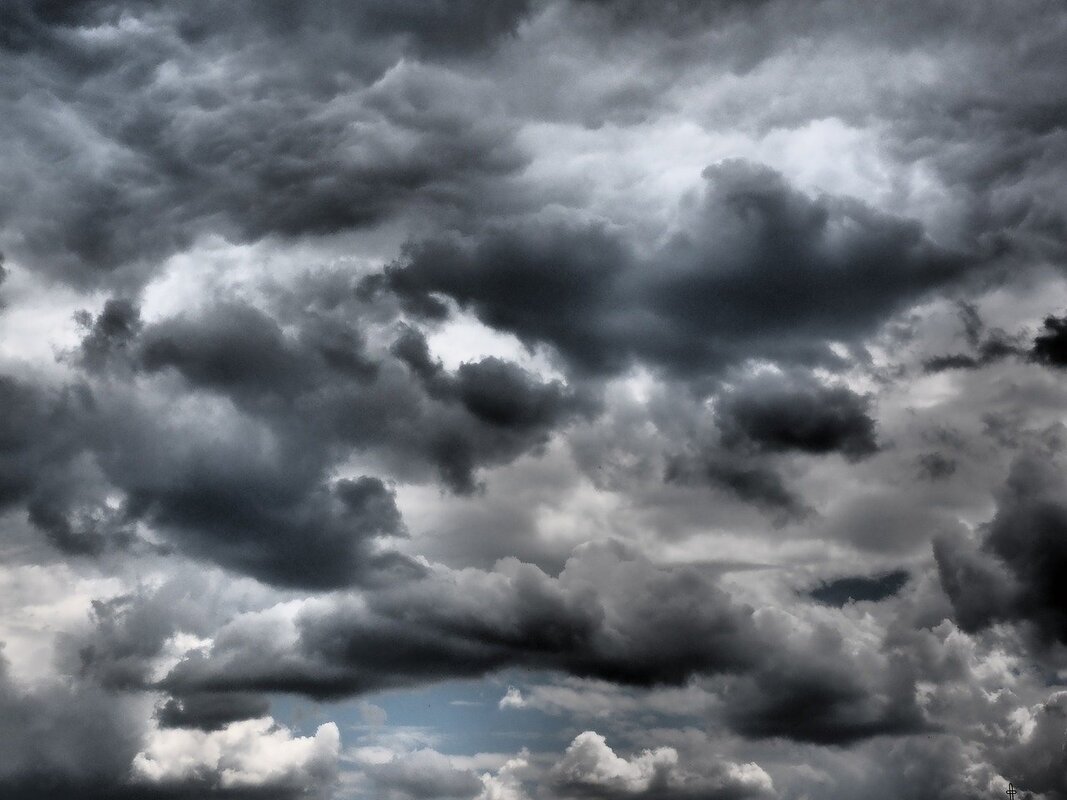
 RSS Feed
RSS Feed

